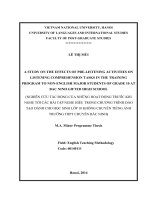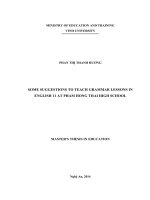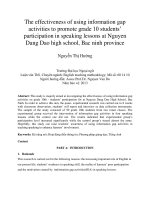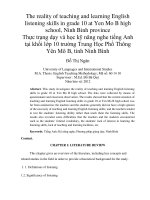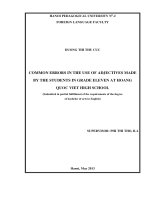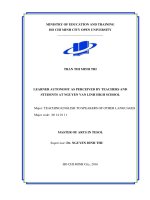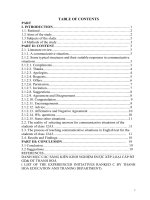APPLYING SOME TEACHNIQUES IN LANGUAGE FOCUS TO DEVELOP LEARNERS’COMMUNICATION SKILLS FOR STUDENTS IN 12 FORM AT LE VAN LINH HIGH SCHOOL
Bạn đang xem bản rút gọn của tài liệu. Xem và tải ngay bản đầy đủ của tài liệu tại đây (547.87 KB, 14 trang )
I. INTRODUCTION
1.1 . Rationale of the study
English is one of the most popular languages, used by many different countries
in the world. The English language curriculum developed in the context of
communication, language knowledge (phonetics, grammar, vocabulary) is a
necessary tool for developing and developing communication skills. Forming
communication skills is the ultimate goal of the teaching process.
Throughout the years of innovation in high school English teaching, most
of our teachers have explored and have had a certain amount of experience in
active teaching English. During the teaching and observation sessions of my
colleagues, I noticed that most of the students were initially interested in and
actively learning the skills, especially reading skills. However, they are very
discouraged in using the language knowledge that the teacher introduced in the
practice. Whereas the purpose of the exercise is to enable students to use
language knowledge correctly, that language knowledge becomes a necessary
means of forming and developing communication skills. Language Focus is
developed to reinforce and develop students' language competencies, to train to
summarize or refine the language focus introduced in the skills classes.
Therefore, students should practice how they can develop communication skills
through Language Focus.
Many teachers still require students to practice language focus (especially
grammar) in the Language focus lesson by: Doing exercises in the textbook then
on the board record the answer and correct the error. As the reality shows often
cause a tedious, boring, boring, not conducive environment for learning.
Therefore, teachers need to understand the intentions, requirements and
objectives of each lesson, each item so that one can teach the right side of the
lesson, on the other hand can use the textbook creatively Suitable for students
With the help of the Principe, the contributions of my colleagues, the search
through the media, I applied "Some games and teaching techniques" to teach the
practice Language of Language focus "and to some extent obtained relatively
positive results, students use better language. They do not think that language
training is boring or impractical anymore, whereas it is very exciting, proactive,
positive, and effective in learning. That motivates their learning motivation.
Help them enjoy learning English more and use language knowledge to
communicate.
1.2. Aims of the study
The application of "some games and teaching techniques" to the language
focus of Language focus to develop communication skills for students.
1.3. Object and scope of the study.
- Students of Le Van Linh High School.
- Language focus practice session.
1.4. Research Methods.
1
- Observation method (via observation time)
- Method of summarizing experience.
- Experimental methodology.
- Mathematical statistical methods
II. DEVEPOPMENT
1. Set the problem
1.1 theoretical basic
Implementing Resolution No. 40/2000 / Tenth National Assembly; Directive No.
14/2001 / CT-TT of the Prime Minister on renewing the program of general
education.Instruction No. 40-CTTW on June 15, 2004 by the secretariat on
building and improving the quality of teachers and educational administrators,
from 2006 to 2007 school year, Ministry of Education and Training The general
education program, promulgated by the Minister of Education and Training
16/2006 / Decision Ministry of Education and Training on June 5, 2006, states:
"It is necessary to bring into play the positive, Creative, student's; It is suitable
with the characteristics of subjects, characteristics of students, conditions of
each class; Self-study method, ability to cooperate; Practice skills to apply
knowledge into practice; Affect emotions, bring joy, excitement and
responsibility to students.
In general education, English is built in the direction of communication.
Forming communication skills is the ultimate goal of the teaching process;
Language knowledge such as phonetics, grammar, vocabulary introduced in the
Language focus course is seen as a necessary means to form and develop
communication skills, not the ultimate goal of the process. study.
Moreover, teaching instead of taking "Teaching" centered on taking
"Learning" at the center. In the organizational approach, the learner - the object
of the "teaching" activity and the subject of the "learning" activity - is attracted
to the learning activities organized and directed by the teacher, through It
explores what is unclear, not yet passively absorbing the knowledge that has
been arranged by the teacher.
That is why teachers need to understand the intentions, requirements, goals
of each lesson, each item so that one can teach the right part of the lesson, on the
other boldly and creatively in the design of the exercises. Both the right focus of
the article, while attracting active students, actively participate in the process of
training language knowledge. Students can then apply that knowledge into the
process of communication. Activities will make the classroom noisier, but noisy
1.2 Actual situation
This form of communication skills is the ultimate goal of the teaching process.
Language knowledge is the means by which language skills are developed and
developed, and the linguistic knowledge is introduced in the language. So how
can we teach and learn the linguistic knowledge, especially the following? When
introducing grammar knowledge, how should students practice to enable them to
2
use them in specific communication situations in order to meet the goals of the
instructional process?
A Language Focus section of the English-language textbook (Basic-CTE)
is conducted as follows:
Pronunciation
Language Focus
Presentation
Controlled pratice
Grammar
Practice
(vocabulary)
Free practice
( diagram 01)
Production
A Language Focus within 45 minutes, the practice practice only takes about 20
minutes.
Usually, many teachers, after the introductory stage, still require students to
practice their language focus (especially grammar) in the Language focus lesson
by: Doing the exercises in the textbook and then on the board record the pay
Words and fixes.
Example
UNIT 11 : BOOKS
Period: 70- Part E : Language focus ( Modals in passive voice)
(English textbook 12 basic)
After introducing the formula:
Modal verb + be + PP2
The teacher instructs students to practice the structure within 20 minutes .
* If you practice in a traditional manner, it will look like this
* The teacher asks the students to do the following exercises (pages 126127 english textbook 12basic):Unit one : Rewrite the sentences in the
passive.
1.You mustn’t use this machine after 5.30 p.m
2. you must clean this machine every time you use it.
3. you should keep the flowers in warm sunny place.
4. you should pay your bill before you leave the hotel
5. you should give us the information now.
……………………………………………………..
Unit two: Complete the conversation with the suitable passive form of the
verbs in brackets.
Naomi : Dr. Kay, I’d like to ask how meals ( 1. will/ prepare) ….in the Space
Station. …..food ( 2. Be going to/ cook)……on board or taken in the form of
tablets?
Dr. Kay: Neither . Gourmet meals ( 3. will/pre-package)….on Earth then they (4.
can/warm up)………on board.
Naomi:......
………………………………………………………
Dr. Kay:…………………………………………………
Then the teacher put the students up on the board to record their answers
3
and correct them
With the traditional practice of the above, I find that:
- Students often do exercises in the form of coping, dependence, sometimes too
much abuse of reference books makes children lazy thinking, not creative.
- The classy, boring classroom atmosphere leads to children who are not
interested in active teaching.
- They do not know how to use their linguistic knowledge to express their
communication in real life situations in order to serve their lives.
Therefore, the formation and development of communication skills for
children are difficult.
2. Solve the problem.
To overcome the limitations of traditional practice, this type of exercise does
not meet the communication goal of teaching English. Because linguistic
knowledge is seen as a means, not a means of communication. Is the ultimate
destination of the learning process.
So in order for students to develop communication skills in Language Focus, I
have applied "Some games and teaching techniques" to design appropriate
exercises that help students to practice. Language knowledge, both developed
communication skills
The application of "some games and teaching techniques" to teach language
training for the Language Focus course in basic English textbooks.
Using games and learning techniques in the practice will attract all
students to participate in the exercises, students will learn more actively, more
active, classroom atmosphere is no longer tedious and tense. Bored again
The word "diagram 01" shows that the language training step consists of two
parts:
* The first part of the training session is a controlled practice. The trick most
commonly used here is drills. In this section students learn through repetition,
copying to form habits. This step is very short, only about 5 minutes.
Some of the techniques that I usually use in step 1 are
*Picture Drill
*Realia Drill
* Word cue drill
The second part of the exercise is free practice: In this section, students use
suggested words to form structured sentences, or do homework assignments.
Preparatory or in the textbook, in the form of groups or pairs. Teachers come in
groups to help them.
Here are some games that I usually use in step 2:
* Noughts and Crosses
*Lucky number
*Pelmanism
*Substitution Boxes
* Slap the board
4
In general, the purpose of the training step help students utilize new
language knowledge accurately, through a process that goes from the practice of
guided practice to free practice. You can transport Use the knowledge learned in
specific situations to form and develop communication skills for students.
Based on the games, teachers can design exercises that match the content
of each lesson, each student object. Here are some examples I have used in
teaching at Le Van Linh High School.
Illustration
Example 1: UNIT 11 : BOOKS
Period : 70 - Part E : Language focus ( Modals in passive voice )
( Englishtextbook 12 basic)
Step 1 (5 minutes): Using the Realia Drill technique:
- Teachers ask students to observe the entire interior of the classroom,
pointing out (or thinking in their head) what needs, should or should be
replaced, repaired, repainted, so on.
.for example : The door/must/repair.
The windows/should/replace.
The walls/should/ repaint.
The desks /must/ clean/everyday.
…………………………………………
- The teacher points to the door and read aloud the sample 2-3 times:
The door must be repaired
- Teachers ask students to read sample sentences 3 times.
- Teacher asks 2-3 students to read sample sentences.
- Teacher pointing at the walls ( The walls ) And follow the steps above:
The walls should be repainted
- Students work in pairs and order other sentences themselves.
*Possible sentences :
The windows should be replaced.
The desks must be cleaned everyday.
The blackboard should be repainted.
………………………………………………..
Step 2 (15 minutes): Use the game Noughts and Crosses
Teacher 9 squares up on the board, each box with a picture (with the average
student, the teacher should give them the suggested words). A box on the board,
each box with a picture (with the average student, the teacher should provide
them with suggestions)
5
1.The road/ should /
repair.
4.The coach/should/
repair.
7. They /need /help.
2.The tap/should/turn
off.
3. The house/ must/
rebuild.
5.The window/must/
close.
6. The house/may/
sell.
8. The toilet/must/
clean.
9.The walls/ should/
repaint
- Teacher makes a sample sentence using any picture in the boxes:
6.The house/may/ sell
The house may be sold.
The teacher divides the students into two groups: one group is Noughts (O) and
one group is Crosses (X)
- The teacher gives the members of each group a discussion of the pictures in
about 2 minutes.
Then, the two groups select the pictures in the box, passing the sentence in
passive form with the verb short.
- The group that makes the right choice will get an "O" or an "X" for example
one
6
* Nhóm Noughts ( O ) choose the picture one :
1. The road/ should/
repair
* Students set the sentence: “ The road should be repaired.”
* So the Noughts (O) got an "O"
O
X
Group Crosses ( X) Pick the picture five :
5.The window/must/
close
* Students set the sentence:
“The window must be closed”.
* So the group Crosses ( X ) Be one “X”.
- The groups continue to select pictures and set sentences.
- A team with three "O" or three "X" on a horizontal, vertical or diagonal line
wins. *Suggested answers:
1. The road should be repaired.
2. The tap should be turned off ( after being used )
3. The house must be rebuilt
4. The coach should be repaired
5 . The window must be closed ( when it is windy ).
6 . The house may be sold
7. They need be helped
8t. The toilet must be cleaned (everyday).
9. The walls should be repainted.
Example two :
7
UNIT 5: HIGHER EDUCATION
Period: 30 - Part E: Language focus ( conditional sentences )
(12th grade English basic)
Step 1: Using Picture drill:
- The teacher prepares a number of paintings and vocabulary related to
conditional types 1,2,3.
1. They/go/for a picnic/
tomorrow/they/play/many
games.
2.He/get/up/early/yesterday
he/not/go/to/school/late.
,
.
.
4. It/ warm/tomorrow/
they/go/for a picnic
3. There/be/something/eat/
now/ she/not/be/hungry.
.
5.He/work/hard/
he/get/better/marks/last week.
6. She/have /a/computer
now, she /not/feel/tired.
- Teacher gives students a glimpse of the pictures and the words in the paintings.
- The teacher gives a picture to the class.
2. He/ get
up/early/yesterday/
he/ not/go/to/school/late.
- Teacher reads aloud sample (2-3 times):
If he had got up early yesterday, he would not have gone to school late.
8
- The student asks the students to read sample sentences 3 times.
- Teacher asks 2-3 students to read sample sentences.
- The teacher continues the steps with the second painting:
4. It/ warm/tomorrow,
they/go/for a picnic
If it is warm tomorrow, they will go for a picnic.
- Students work in pairs to make sentences with the remaining paintings
(Teacher hangs the remaining paintings up on the board).
*Suggested answers:
1. If they go for a picnic tomorrow, they will play many games
2. If he had got up early yesterday, he wouldn’t have gone to school late.
3. If there were something to eat now, she wouldn’t be hungry.
4. If It is warm tomorrow, they will go for a picnic.
5. If he had worked hard, he would have got better marks last week.
6. If she had a computer now, she would not feel tired.
Step 2: Use the Pelmanism game.
- The teacher prepares 14 cards with cover (or paper).
+ On the one hand the teacher hits numbers 1-14
On the other hand, the teacher writes the propositions of conditional types 1,2,3.
(From conditional clause 1-7, clause 8-14).
I wouldn’t drink so much.
8
1
If you had told me earlier,
9
2
If it rains,
3
If she had a car,
10
she will go swimming.
4
If I spoke Korean,
11
5
If she had worked hard,
12
she would go out in the
eeeeeeeeeeeeêeevening
I will stay at home.
6
If it is hot,
13
7
If I were you,
14
I could translate this.
I would have given it to
you.
She would have passed the
exams
- Teachers paste the cards on the board (1-7 stickers on one side, 8-14 on one
side), showing students the numbered face.
9
- Divide the class into two groups A and B.
- In turn, each group chooses two numbers (some in columns 1-7, some in
columns 8-14).
- Flip the two student cards selected. If they match, the group will get points (the
teacher asks the students to explain why they match). For example * groups
A choose two number :
and
12
2
* Students flip two cards with two matching clauses:
If it rains,
I will stay at home
* These two clauses match together into one type 1 conditional clause.
* So group A will get one point
- Flip the two selected cards, if they do not match, then overturn the same and do
not score (teacher asked the students explain why not match).
For example: * Group B chooses two numbers:
10
5 and
* Students flip two cards with two matching clauses:
If she had worked hard,
she will go swimming
* These two clauses do not match (because the conditional verb is divided in the
form of the third conditional, the verb of the main clause being divided in the
form of the first conditional. These two clauses are not synonymous).
* Turn cards face down, and group B does not score
-Continue the game until all the cards are overturned.
- Which team more points than the winning team.
*Suggested answers:
1- 13
;
2 - 12
; 3 - 11
;4-9
5 – 14
;
6 – 10
; 7–8
Example 3
UNIT 2: CULTURAL
Period :12 – Part E : Language Focus ( Review of tense)
( 12th grade english basic)
Step 1: Use the technique Word cue drill
- The teacher prepares about 3 to 4 verbs:
watch
have
cook
- Teacher glances through the vocabulary
10
- The teacher sets the sample sentences with the first verb for students to hear
(each verb can set different sentences in the ones mentioned in the introduction).
Example:
have
Teacher makes sentences:
I have breakfast at 7 a.m every day.
-The teacher asked the students to read the same sound and personal sample.
The teacher continues with the above steps:
She is having a bath at the moment.
I had had a computer......
I will have dinner ..............
He has been having a bath.............
- Students give sentences to other verbs.
Step 2: Use the game Substitution Boxes
- Teacher on board a frame box filled with words- The words in the box are
mated together to form many sentences that the verb is divided in different
places.
Example: Hoa is Watching T.V now.
Has
all
day
have
I
Watches
often
go
Every
shopping
will
next
Clean
the
house
T.V
been
am
Week
Hoa is
now
Watching
and Mai
are
Had
a new
bought
Cleaned
they
repairing
- Teachers divide the class into 2 groups (depending on the number of students
in the class to divide the group)
Groups discuss each other: Use words in the box to put together sentences (as
many sentences as possible). One word can be used multiple times.
The teacher then asks the two teams to write their discussion results up on the
board for a certain time (eg, within 5 minutes). The group members turn to
write.
- The group that writes the most correct sentences is the winning team.
*Possible sentences:
- The present simple tense :
- The present continuous tense:
*Hoa and Mai go shopping every week.
* They are repairing the house.
11
*Hoa and Mai often clean the house.
* Hoa is watching T.V.
*Hoa watches T.V every day.
*I am watching T.V.
*Mai often watches T.V.
*Mai is watching T.V now.
*They go shopping everyday.
* Hoa and Mai are repairing the
.
TV,etc.
*I clean the house every week,………etc
- The past perfect tense:
- The future simple tense:
*Hoa had bought a new T.V.
*Hoa will clean the house next week.
*Mai had cleaned the house.
* Mai and Hoa will go shopping .
*They had bought a new house.
* I will clean the house.
*I had cleaned the house,…etc.
* They will go shopping,………….etc.
- The present perfect continuous tense :
* Hoa has been watching T.V all day.
* They have been repairing the house .
* I have been watching T.V.
* Mai has been repairing the T.V,etc.
3.
The results of the application of "some games and teaching
techniques" into the language practice in the Language Focus
course in English CB.
To develop communication skills for students in Language Focus, I have
applied "Some games and teaching techniques" to teach language learning in
the form of "Learning to play" Play, learn "and obtained relatively satisfactory
results:
* Results obtained through the tests as follows:
Class
12 G
(45Hs)
12B
(45Hs)
No measures (according to survey data at the
beginning of the school year 2015-2016)
: Great
Rather
medium
Weak
Cream
S
% S %
S
%
S %
S %
L
L
L
L
L
1
2,2 5 10.9 15 32,6 22 47,8 2 6,5
After applying the measures at
of the school years 2016-2017)
Great
:Rather
medium
S % SL %
S
%
L
L
7 15 15 33 16 35
Weak,
S %
L
7 17
2
8
5
4,3
7 15,2
13
28,3
21
45,7
2
6,5
17
17
37
15
33
the end
13
And I noticed that:
* Students change their attitudes toward learning the language (especially
grammar). They are very excited because they have been learning, playing,
arguing comfortably, without pressure, and are highly effective.
* From a picture, real objects students can put a lot of different sentences.
Therefore, it will promote students' initiative and creativity to their linguistic
knowledge
* Exercises are associated with real objects and pictures, which help them to
connect with reality better so that they can apply their grammatical knowledge
12
to communicate the contents of the communication. Specific situations in study
and in real life to serve life.
Forms of group training, pairs (integrated in games, techniques) help children
practice more, make use of time; Teach children how to learn from each other;
Encourage the students to say, the shy children have the confidence to voice
their opinions
* Classroom atmosphere: lively, no longer boring and boring; Create
confidence, joy in learning for the children.
III CONCLUSIONS
1.The conclusion
Teaching-learning Language focus according to many teaches is not a difficult
task, more to ask students to practice, just use the available exercises just fine.
However, teaching how to motivate learners in the direction of learning, how to
help students use language knowledge as a means to form and develop
communication skills is not an easy task. Therefore, in the process of teaching, if
you are really concerned with the lesson you will find it necessary to innovate
teaching methods. The application of "games and teaching techniques" to
teaching-learning the steps I raised in this subject is not only meaningful for my
students in the development of linguistic knowledge but also Great sense of the
general learning habits of children, it is always active, active and creative.
Forming them for teamwork skills, communication skills in English so that they
can adapt to today's constantly-evolving society, so that they can become
confident people in the face of difficulties. Scarf and challenge of the present
life.
2. Recommendation.
* For the school:
Building functional rooms. Because every time a game is organized, in pairs,
the group always makes the class noisier and more likely to influence the next
class, which often leads to teachers hesitating to organize activities.
* For Education and Training:
Expand the trainees to innovate teaching methods, not only training for the
team leader but also other teachers.
I sincerely thanks!
The Headmaster’s identification
Tho xuan. The second of second
April 2017.
I ensure that this study has been
written by me.
The writer
Nguyen Thi Hanh
13
REFERENCES
Ministry of Education and Training, 2005 English 12, Educational Publishing
House
- Ministry of Education and Training, 2007 English 12, Educational Publishing
House.
- Ministry of Education and Training, 2009 Guiding the implementation of
standard knowledge skills in English upper secondary school, Educational
Publishing House.
- Thanh Hoa Department of Education and Training, 2005 English Language
Teaching Methodology for teachers in lower secondary schools
(Technical Guidance Document - June 2005)
- Hoàng Văn Vân, 2008 Program Implementation Manual, 12th grade textbooks
in English, Educational Publishing House.
14
